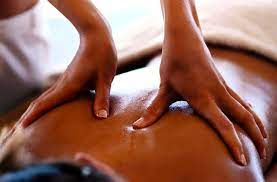The Power of Panchakarma for Women’s Health during life transition from perimenopause, menopause and to post menopause. Why is this my third year of going to India for my Panchakarma Detox?
- Alena Speed
- Oct 14, 2024
- 4 min read

From about late thirties, we start a gradual transition from Pitta stage of life to Vata stage of life.
This transition may take nearly 10 years or more and in modern medicine is referred as Perimenopause.
In Ayurveda this period is called Rajonivrittikala (Raja = Menstruation, Nivritti = Cessation, Kala = time period).
The ovaries gradually reduce oestrogen hormone production causing symptoms that are very drastic and life altering for some and nearly unnoticeable for others.

Why is some of us pass through this transition with the swiftness and lightness of a gazelle while others are hit by the truck load of symptoms:
· Body Aches – specific, non-specific, travelling joint or muscle aches etc.
· Fatigue, excessive tiredness
· Numbness in body parts
· Nausea, tastelessness
· Excess sweating, hot flashes
· Grief and mood swings, anxiety
· Various digestive issues, acid peptic disorders, increased or decreased appetite
· Disturbed or loss of sleep
· Worsened premenstrual symptoms
· Vaginal dryness and urinary incontinence
· Fat gain especially around the waist line including visceral fat – the bad one (around the internal organs)
· Difficulty to gain lean muscle mass
And no, you are not going crazy, your body is changing whether we want it or not.
The presence and severity of the above symptoms will depend on so many factors, some which are not under our control (hereditary factors, body constitution – in Ayurveda we would call it Prakruti), but a lot of them are certainly in our control to impact, i.e. dietary and lifestyle choices, our mental state, surrounding environment and so on.
So, where do you choose to be?
Of course, we are dealt with certain cards in life but so much more is up to our choices. Going back to my previous post of Spring Cleanse and the acquiring of new better habits, day by day, year by year – your daily choices, daily self-care, self-respect and positive outlook matter so much; let’s get excited of what’s ahead, be informed and not be fearful!
This brings me to a wonderful practice of Panchakarma – yearly Ayurvedic Detox that was practiced for thousands of years with the simple purpose – keeping balance of your bodily systems (doshas).

If we check in with our body every year in a profound a meaningful way – we catch majority of the issues in their birthing stage, when they haven’t spread into other areas of the body or even worse manifested into something unpleasant.
Where am I starting to fall off the wagon – is my digestion a bit off – maybe a bit of bloating and constipation is creeping in? Vata dosha needs a bit of attention.
Hmm, maybe I notice some extra weight around the waist and just generally getting sluggish and uninterested in movement or exercise, skin is getting a bit dull and blocked. Kapha dosha needs to be reduced.
Or maybe, stress levels are high, you are feeling hot and bothered, have some skin rashes, ulcers, burning macturation etc. Pitta dosha is in excess.
When you take 2-3 weeks each year to slow down, check in with yourself, go through some cleansing therapies – you bring all these excess doshas (potential imbalances) back to their original sites and hence, your balanced body can then flourish, be in the state of growth, happiness and flow, rather than constantly playing a catch up.
That is why, this is my third year of taking a few weeks to undertake Panchakarma Detox at the Ayurvedic Hospital.
I am very aware that my body is undergoing through transition. I am very positive about what’s to come and excited about making self-care my strength and superpower.

Every year, I get to bring any imbalances that accumulated in my body in check, which in turn, I am positive, will make my life transitions pleasant and joyful.
Ayurvedic Approach during Perimenopause/Menopause transition:
· If the symptoms are mild or unnoticeable
o maintain Pitta Vata balancing lifestyle
o regular oil massage (self-massage or Abhyanga in clinic setting) becomes even more important – brings daily stress down, removes tension and body aches, nourishes and oleates the skin, great to prevent osteoarthritis of the joints which is so common in postmenopausal women due to decline in oestrogen hormone and general wear and tear
o The best self-massage oils during this time are Black sesame oil, Maha Narayana oil (especially for those with joint pain) or Ksheerabala oil (especially for those with sleep issues)
· If the symptoms are severe, like heavy sweating, excess mood swings, heavy bleeding with clots:
o Panchakarma treatment first to eliminate excess dosha (imbalance)
o Herbal Supplementation as per your Ayurvedic doctor/practitioner prescription
o Then maintain Pitta Vata balancing lifestyle and daily routine
Ayurvedic Diet During Perimenopause/Menopause transition:
Rich in Calcium – cooked green leafy vegetables, moringa, asparagus, green beans, almonds (soaked overnight), sesame and flex seeds, herbs like basil, parsley, dill, coriander
Rich in iron – see Ayurvedic Iron Boosting tips post (coming)
Rich in protein – plant based or animal based
Special Ayurvedic Herb for Perimenopause/Menopause – Shatavari (will write separately about it)
If you like to know more about how to manage during the transition, Dr. Prathiba and I are running Women's Health Masterclass in November.

If you like to join me and a small group of ladies for upcoming Panchakarma Detox Retreat to India, all details are HERE.







Comments